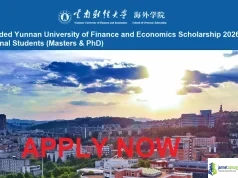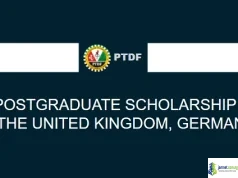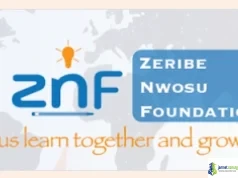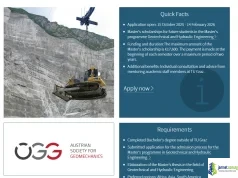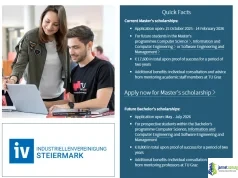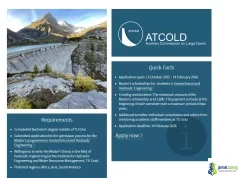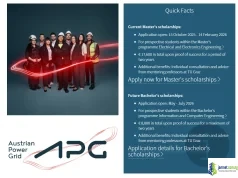The ENS International Selection Scholarship 2026 is a prestigious, fully funded Masters France program offered by the École Normale Supérieure (ENS) in Paris. This highly competitive selection process aims to enroll outstanding international students for a Master’s Degree (Master 1) or a final year of a Bachelor’s Degree (Licence 3), leading to the highly-regarded ENS Diploma. The scholarship provides a substantial €1,000 monthly grant for 3 years, full tuition fee coverage (as ENS is a public university), and guaranteed accommodation on one of the ENS campuses. The selection process involves a pre-selection based on the application dossier, followed by remote oral and written exams (for Arts & Humanities) or oral exams only (for Sciences).
Candidates must be under 26 years old at the time of application and must not have lived in France for more than 10 months in the selection year. The application deadline for Arts & Humanities is typically December 3, 2025, and for Sciences is typically December 15, 2025.
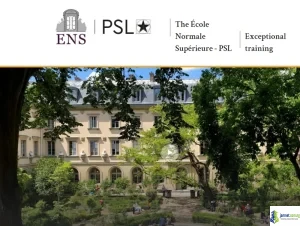

The École Normale Supérieure (ENS), a flagship institution of French academic excellence and part of the Université PSL, offers the ENS International Selection Scholarship 2026. This competitive program is designed to recruit the world’s most promising students, providing a fully funded Masters France experience and an unparalleled education in the heart of Paris.

Join our Telegram Channel for Instant Scholarship Updates
The program is more than just financial aid; it is a gateway to the status of a normalien, granting access to rigorous research, exceptional faculty, and a privileged environment for up to three years. If you seek to study in France Master’s level programs and distinguish yourself in the global academic community, this guide details the rewards, eligibility, and the step-by-step process for the 2026 intake.
The financial and academic package provided by the ENS International Selection Scholarship 2026 is designed to eliminate financial concerns, allowing scholars to focus entirely on their advanced studies and research.
Scholarship Benefits
The value of this scholarship is one of the most generous of its kind in Europe, structured to ensure complete stability for the duration of the program.
- Generous Monthly Grant: Successful candidates receive an ENS monthly stipend of €1,000 per month for up to three years. This allowance, totaling €12,000 per year, is provided to cover essential living expenses in Paris.
- Full Tuition Fee Exemption: As the École Normale Supérieure scholarship is offered by a public university, students benefit from a complete waiver of tuition fees, which is a major component of this fully funded Masters France opportunity.
- Guaranteed Campus Accommodation: A crucial non-monetary benefit is the provision of a room on one of the ENS campuses. This subsidized housing not only offers affordability but also ensures immediate integration into the vibrant academic community.
Academic Distinction and Duration
The program integrates two distinct levels of study, depending on the applicant’s current academic standing:
- Target Levels: The program incorporates students to be enrolled in the 3rd year of a Bachelor’s (Licence 3) or the 1st year of a Master’s (Master 1).
- ENS Diploma: Scholars pursue their studies simultaneously at ENS and a partner university, ultimately earning both a Master’s degree in their specialization and the highly regarded ENS Paris diploma, a sign of elite academic training.
- Duration: The scholarship funding and benefits are provided for a period of 3 years, subject to satisfactory academic performance.
Academic Tracks and Positions
The competition is split equally across two broad areas of study:
- Sciences (10 Positions): Disciplines include Mathematics, Physics, Chemistry, Biology, Computing Science, Earth Science, and Cognitive Sciences.
- Arts & Humanities (10 Positions): Fields include Philosophy, History, Economics, Political Studies, Literature, Linguistics, History of Art, Archaeology, Anthropology, and Cognitive Sciences.
Mandatory ENS International Selection Requirements
To be eligible to apply, candidates must strictly adhere to the following rules. Failure to meet any one of these criteria will result in immediate disqualification.
- Age Restriction: Candidates must be under 26 years old at the time of application. Specifically, they must not have reached their 26th birthday by December 1st of the application year.
- Application Limit: Candidates are only permitted to apply only once to the International Selection competition throughout their entire academic career.
- Residency Rule: Candidates must not have lived in France for a period exceeding 10 months during the academic year of the selection (September 1st – August 31st) nor during the previous academic year.
- Minimum Foreign Study: Applicants must justify at least one year of undergraduate studies awarded by a foreign university (outside France) during the calendar year preceding the application’s commencement. Furthermore, they must be able to prove they will have completed at least two years of undergraduate studies in a foreign university by September 1st following admission.
Two-Phase Application Process (Step by Step Guide)
The procedure for how to apply for ENS scholarship funding is unique, combining an academic review of the dossier with rigorous competitive testing.
Phase 1: The Online Dossier Submission
This stage requires meticulous attention to detail and adherence to the deadlines for your specific track.
- Initiate Application: You must fill and validate the initial application form on the official ENS online portal through the link provided below.
- Account Access: You will receive an email within 48 hours to activate your account on the dedicated platform, Dematec, where all materials are uploaded.
- Required Documents: The file must be complete and contain all necessary components, including:
- Detailed Application Form
- Passport/ID Card
- High School Diploma and full University Transcript
- Curriculum Vitae (CV)
- Motivation Letter (1-3 pages)
- Research Project or study project (max 3 pages/10,000 characters for Arts & Humanities; recommended for Sciences). This project must show clear research questions and methodology.
- 2 to 4 Letters of Recommendation submitted confidentially by your referees.
- Deadlines: The deadline for Arts & Humanities is typically December 3, 2025. The deadline for Sciences is typically December 15, 2025. It is imperative to submit the complete file before the specified deadline.
Phase 2: The Competitive Examination
If your application file is deemed outstanding and is selected (shortlisted) by the jury, you will receive an invitation to take the final competitive examinations, which are now typically held remotely.
- The Arts & Humanities Selection: Shortlisted candidates in this track must prepare for both demanding written and oral tests. A high level of French proficiency is essential for success in these fields.
- The Sciences Selection: Shortlisted candidates in this track are typically required to take oral exams only. For these scientific fields, students may often choose to take the oral examinations in either English or French.
The results obtained during this examination phase are the final factor in determining which students are admitted and awarded the prestigious ENS 1000 euro grant.
Language and Department Notes
Prospective applicants must be strategic in choosing their application track, particularly if applying to the interdisciplinary field of Cognitive Studies.
- Language Proficiency: While no official certificate (like IELTS or DELF) is formally required for the initial application, a strong command of French (minimum B1 level is suggested) is necessary for candidates applying to Arts & Humanities, as courses and tests are predominantly in French. For Sciences, the required language level is lower as many departments offer courses in English.
- Cognitive Studies (DEC): Students interested in the Department of Cognitive Studies can apply using either the Science or the Arts & Humanities form indiscriminately. All candidates MUST contact the DEC department to ensure they choose the correct track based on their specific academic background and projected studies, maximizing their chances in the ENS International Selection Scholarship 2026.
Key dates
International selection in Arts & Humanities 2026
- Application: October 1 to December 3, 2025 (12.00 (midday), Paris time)
- Shortlist: From January 15, 2026
- Written tests: Between February 2 and February 6, 2026
- Oral tests: Between February 9 and February 13, 2026
- Admission results: From March 4, 2026
International selection in Sciences 2026
- Application: October 16 to December 15, 2025 (12.00 (midday), Paris time)
- Shortlist: January 27, 2026
- Oral tests: Between March 3 and March 20, 2026
- Admission results: From March 26, 2026
CLICK HERE TO APPLY
For more Information Click HERE
Frequently Asked Questions (FAQ)
Q1: Is the ENS International Selection Scholarship 2026 truly a fully funded Masters France program?
Yes. It provides a full tuition fee waiver (as ENS is a public university), a substantial €1,000 monthly grant for 3 years, and guaranteed subsidized on-campus accommodation.
Q2: What is the primary purpose of the ENS 1000 euro grant?
The €1,000 monthly grant is provided to cover the scholarship recipient’s living and related personal expenses for the duration of their three-year enrollment at ENS.
Q3: What is the age limit to apply for the École Normale Supérieure scholarship?
Candidates must be strictly under 26 years old at the time of application, meaning they should not have reached their 26th birthday by December 1st of the application year.
Q4: Does the scholarship cover only Master’s students, or can I apply during my undergraduate studies?
The program is designed for exceptional students to be enrolled either in the 3rd year of a Bachelor’s (Licence 3) or the 1st year of a Master’s (Master 1).
Q5: If I fail to be selected in 2026, can I reapply in 2027?
No. A strict rule for the ENS International Selection requirements is that candidates can apply only once to this specific competition throughout their entire academic career.
Q6: What is the main difference between the ENS Arts & Humanities selection and the ENS Sciences selection examinations?
The Arts & Humanities selection includes both written and oral competitive tests, while the Sciences selection typically involves oral tests only for shortlisted candidates.
Q7: If I am admitted, how long is the ENS monthly stipend guaranteed for?
The monthly grant of €1,000 is guaranteed for a maximum duration of three years, provided the student maintains good academic standing.
Q8: What does it mean to earn the ENS Paris diploma?
The ENS Diploma is a prestigious institutional certification awarded alongside the Master’s degree, signifying that the student has completed the rigorous training curriculum of the École Normale Supérieure scholarship as an elite normalien.
Q9: Where can I find the initial application form for the ENS International Selection Scholarship 2026?
Applicants must fill and validate the initial form on the official ENS online application portal, typically found on the ENS PSL website under the International Selection section.
Q10: What is the residency rule regarding prior stay in France?
Candidates must not have lived in France for more than 10 months during the academic year of the selection (Sept 1st – Aug 31st) or the previous year to satisfy the ENS International Selection requirements.

